Love Machine: Difference between revisions
Thecubsfan (talk | contribs) No edit summary |
Kokushishin (talk | contribs) mNo edit summary |
||
| Line 17: | Line 17: | ||
|height=5' 10"/178 cm | |height=5' 10"/178 cm | ||
|weight=220 lbs/100 kg | |weight=220 lbs/100 kg | ||
|signatureMoves=[[Frog Splash]], [[Tombstone]], [[Belly-to-belly Suplex]], [[Dropkick to the face | |signatureMoves=[[Frog Splash]], [[Tombstone]], [[Belly-to-belly Suplex]], [[Dropkick]] to the face, Short Clothesline | ||
|titles=[[PNW TV Title]], [[PNW/NWA Tag Team Titles]] (2, w/ [[Big Juice]] - The Juicer Patrol, w/ [[Jesse Barr]]), [[PNW/USA Tag Team Titles]] (w/ [[Konnan|Konnan El Barbaro]]), [[AAA/IWC World Tag Team Titles]] (w/ [[Eddy Guerrero]]) | |titles=[[PNW TV Title]], [[PNW/NWA Tag Team Titles]] (2, w/ [[Big Juice]] - The Juicer Patrol, w/ [[Jesse Barr]]), [[PNW/USA Tag Team Titles]] (w/ [[Konnan|Konnan El Barbaro]]), [[AAA/IWC World Tag Team Titles]] (w/ [[Eddy Guerrero]]) | ||
}} | }} | ||
== Career == | == Career == | ||
Art Barr was the son of Sandy (wrestler, referee and long time promoter in the Oregon area) and the brother of Jesse (who wrestled in the WWF as Jimmy Jack Funk). Art was an accomplished | Art Barr was the son of Sandy (wrestler, referee and long time promoter in the Oregon area) and the brother of Jesse (who wrestled in the WWF as Jimmy Jack Funk). Art was an accomplished amateur wrestler, as he became a 4-time district champion and a 2-time Oregon State champion, but he had to drop out when his first wife became pregnant. Art worked in a steel mill during the day, and would train to become a pro-wrestler at night with his father and Roddy Piper, who taught him how to properly use his natural charisma. Art made his professional wrestling debut April 2, 1987 under his real name in Salem, Oregon; weighing only 175 pounds, he was way too small to become a serious threat to the main eventers, so he mainly competed in the opening contests of the shows he worked. On January 21, 1989, while Art was in the ring during a televised show, Piper and other three wrestlers entered the ring, covered Art with a sheet, stripped him naked, threw his clothes to the crowd and gave him a new suit. Piper had also sprayed something in Art's hair, grabbed the mic claimed that he created The Beetlejuice, took off the sheet and revealed Art with his new Beetlejuice gimmick. Ironically, in a a traditionalist promotion, he became the most popular wrestler among the fans. He especially was a hero to children, as he'd usually fight and defeat heels including Al Madril or Abuddah Dean. | ||
Beetlejuice also tasted success in the tag ranks teaming with "Big Juice" as The Juice Patrol. In 1990, they were the top men in the division along with the team of Ricky Santana and Curtis Thompson. On June 30, 1990, Big Juice lost a "loser-leaves-town" match, but it didn't negatively affect Barr as WCW management had began to take notice of him. | Beetlejuice also tasted success in the tag ranks teaming with "Big Juice" as The Juice Patrol. In 1990, they were the top men in the division along with the team of Ricky Santana and Curtis Thompson. On June 30, 1990, Big Juice lost a "loser-leaves-town" match, but it didn't negatively affect Barr as WCW management had began to take notice of him. | ||
=== World Championship Wrestling & EMLL === | === World Championship Wrestling & EMLL === | ||
At the time, WCW was very distant to the WWF in terms of popularity among the younger viewers, but they noticed a lot of potential in Barr as a new idol for kids. Art entered WCW as the same character, but changed his name to the Juicer, in order to avoid potential copyright problems. While in WCW, Ole Anderson allegedly told Art that he'd never get over | At the time, WCW was very distant to the WWF in terms of popularity among the younger viewers, but they noticed a lot of potential in Barr as a new idol for kids. Art entered WCW as the same character, but changed his name to the Juicer, in order to avoid potential copyright problems. While in WCW, Ole Anderson allegedly told Art that he'd never get over because he was way too small, in which Art remarked that "I'm as tall as you are, you are just fat." | ||
Ten weeks after Barr signed with WCW, he was found guilty of sexual harassment on a 19 year old girl named Angela. The 16th of July of 1989, after a wrestling show in Pendleton, OR, Arthur had a late-night sexual meeting at a deserted armory, underneath a stairwell, with that female fan that later charged him with rape. Art always claimed that he had had that meeting with the fan and that he knew that she didn't want to have sex with him at that place, but that he thought that she would have wanted it somewhere else, and he never accepted that he was guilty. In the end, he was fined with $1,000 and with the payment of the medical and counseling bills of the victim, and he was sentenced to 180 hours of community service work. Barr didn't take the case to court and accepted the plea-bargain, and what was expected to be a chapter of his life that would get quickly forgotten, got worse as local media (TV and newspapers) started putting huge pressure to the | Ten weeks after Barr signed with WCW, he was found guilty of sexual harassment on a 19 year old girl named Angela. The 16th of July of 1989, after a wrestling show in Pendleton, OR, Arthur had a late-night sexual meeting at a deserted armory, underneath a stairwell, with that female fan that later charged him with rape. Art always claimed that he had had that meeting with the fan and that he knew that she didn't want to have sex with him at that place, but that he thought that she would have wanted it somewhere else, and he never accepted that he was guilty. In the end, he was fined with $1,000 and with the payment of the medical and counseling bills of the victim, and he was sentenced to 180 hours of community service work. Barr didn't take the case to court and accepted the plea-bargain, and what was expected to be a chapter of his life that would get quickly forgotten, got worse as local media (TV and newspapers) started putting huge pressure to the commission to revoke his wrestling license. The Oregon boxing & wrestling commission found out that in his license questionnaire he claimed that he had never been convicted of felony and denied him the right to renew his license anymore. Even though Barr was involved in controversy over sexual harassment ten weeks after signing with WCW, owner Jim Herd didn't fire him, as he felt that Barr had already paid his debt to society. However, news of the incident resulted in condemnation from the audience, as they chanted "rapist" during his matches. As a result, Herd decided to stop using Barr, because he felt that promoting "a nasty rapist" as a hero to the kids would tarnish the company's image. | ||
Barr's charisma and ability was noticed by Konnan in December 1990, as he was invited (along with Rey Misterio Sr.) to compete at WCW Starrcade 90. Konnan would bring Barr and Norman Smiley to Mexico's EMLL promotion in early 1991. Art was given the gimmick of The American Love Machine, a masked American tecnico (babyface) with a sexy playboy gimmick, in March 1991. He soon became a popular performer and was given the chance to have a singles feud with Blue Panther, who was one of the most respected wrestlers from Mexico. His rivalry with Panther further elevated Love Machine as a top draw for the promotion, and following a huge build-up, a máscara contra máscara contest was scheduled for April 3, 1992 at Arena México; 18,000 fans packed in the 17,100 capacity building, while the other 8,000 fans were turned away at the door. EMLL management predicted that the attendance would overflow, so a set of giant TV screens were set up in the parking lot of the building. Panther won that match, after Love Machine was instantly disqualified for using the "martinete" (a tombstone piledriver) on Blue Panther during the third and final fall; Machine apparently didn't know that the martinete was a banned move, as the audience was more concerned about the health of Panther (who was stretchered out of the ring) than Love Machine removing his mask. | Barr's charisma and ability was noticed by Konnan in December 1990, as he was invited (along with Rey Misterio Sr.) to compete at WCW Starrcade 90. Konnan would bring Barr and Norman Smiley to Mexico's EMLL promotion in early 1991. Art was given the gimmick of The American Love Machine, a masked American tecnico (babyface) with a sexy playboy gimmick, in March 1991. He soon became a popular performer and was given the chance to have a singles feud with Blue Panther, who was one of the most respected wrestlers from Mexico. His rivalry with Panther further elevated Love Machine as a top draw for the promotion, and following a huge build-up, a máscara contra máscara contest was scheduled for April 3, 1992 at Arena México; 18,000 fans packed in the 17,100 capacity building, while the other 8,000 fans were turned away at the door. EMLL management predicted that the attendance would overflow, so a set of giant TV screens were set up in the parking lot of the building. Panther won that match, after Love Machine was instantly disqualified for using the "martinete" (a tombstone piledriver) on Blue Panther during the third and final fall; Machine apparently didn't know that the martinete was a banned move, as the audience was more concerned about the health of Panther (who was stretchered out of the ring) than Love Machine removing his mask. | ||
| Line 42: | Line 42: | ||
=== When Worlds Collide and Death === | === When Worlds Collide and Death === | ||
On November 8, 1994, Barr was featured in one of the main events at the WCW-produced AAA/IWC When Worlds Collide PPV; Barr and Guerrero competed against Octagon and El Hijo del Santo in a Best 2/3 Falls, Double Hair vs. Double Mask match. There were backstage problems prior to the match, as Art and Octagon were removed from the booking sheet and booked as seconds to their partners. In addition, WCW production decided to cut the broadcast down 45 minutes from the original run time, resulting in all of the undercard matches becoming one-fall to a finish, and cutting the tag team semi-main event from 30 minutes to 20 minutes. The match ended up impressing | On November 8, 1994, Barr was featured in one of the main events at the WCW-produced AAA/IWC When Worlds Collide PPV; Barr and Guerrero competed against Octagon and El Hijo del Santo in a Best 2/3 Falls, Double Hair vs. Double Mask match. There were backstage problems prior to the match, as Art and Octagon were removed from the booking sheet and booked as seconds to their partners. In addition, WCW production decided to cut the broadcast down 45 minutes from the original run time, resulting in all of the undercard matches becoming one-fall to a finish, and cutting the tag team semi-main event from 30 minutes to 20 minutes. The match ended up impressing promoters all over America, as ECW booker Paul Heyman immediately contacted Art Barr and Eddy Guerrero about coming in to feud against The Public Enemy (who were the top tag team in ECW at the time); Art confirmed this in a shoot interview following the PPV, and said that he looked forward to competing in ECW. Art additionally was scheduled to compete at New Japan's annual Tokyo Dome show on January 4, 1995. WCW and WWF additionally showed interest in Barr and Guerrero as a tag team | ||
Three weeks after the pay-per-view, Art Barr was found lying in bed without a pulse and bleeding from the nose by his mother. Preliminary reports claimed that Barr died of an aneurysm, but later reports ruled that he died under unknown circumstances. Barr suffered from no heart problems, there was no aneurysm or internal bleeding from ring injuries and a drug overdose was ruled out, even though sleeping pills were found in his system. Prior to his death, he was planning to marry his pregnant fiancé and had finally quit drugs and wild partying. | Three weeks after the pay-per-view, Art Barr was found lying in bed without a pulse and bleeding from the nose by his mother. Preliminary reports claimed that Barr died of an aneurysm, but later reports ruled that he died under unknown circumstances. Barr suffered from no heart problems, there was no aneurysm or internal bleeding from ring injuries and a drug overdose was ruled out, even though sleeping pills were found in his system. Prior to his death, he was planning to marry his pregnant fiancé and had finally quit drugs and wild partying. | ||
Revision as of 06:18, 1 November 2017
Profile
| Love Machine | |||||||||||||||||||||||||||||
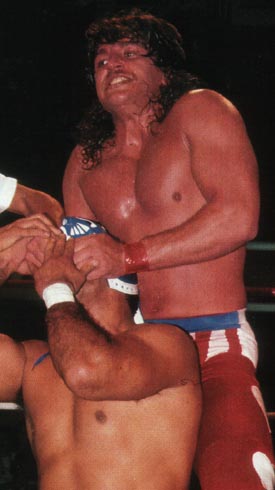 |
|
||||||||||||||||||||||||||||
Career
Art Barr was the son of Sandy (wrestler, referee and long time promoter in the Oregon area) and the brother of Jesse (who wrestled in the WWF as Jimmy Jack Funk). Art was an accomplished amateur wrestler, as he became a 4-time district champion and a 2-time Oregon State champion, but he had to drop out when his first wife became pregnant. Art worked in a steel mill during the day, and would train to become a pro-wrestler at night with his father and Roddy Piper, who taught him how to properly use his natural charisma. Art made his professional wrestling debut April 2, 1987 under his real name in Salem, Oregon; weighing only 175 pounds, he was way too small to become a serious threat to the main eventers, so he mainly competed in the opening contests of the shows he worked. On January 21, 1989, while Art was in the ring during a televised show, Piper and other three wrestlers entered the ring, covered Art with a sheet, stripped him naked, threw his clothes to the crowd and gave him a new suit. Piper had also sprayed something in Art's hair, grabbed the mic claimed that he created The Beetlejuice, took off the sheet and revealed Art with his new Beetlejuice gimmick. Ironically, in a a traditionalist promotion, he became the most popular wrestler among the fans. He especially was a hero to children, as he'd usually fight and defeat heels including Al Madril or Abuddah Dean. Beetlejuice also tasted success in the tag ranks teaming with "Big Juice" as The Juice Patrol. In 1990, they were the top men in the division along with the team of Ricky Santana and Curtis Thompson. On June 30, 1990, Big Juice lost a "loser-leaves-town" match, but it didn't negatively affect Barr as WCW management had began to take notice of him.
World Championship Wrestling & EMLL
At the time, WCW was very distant to the WWF in terms of popularity among the younger viewers, but they noticed a lot of potential in Barr as a new idol for kids. Art entered WCW as the same character, but changed his name to the Juicer, in order to avoid potential copyright problems. While in WCW, Ole Anderson allegedly told Art that he'd never get over because he was way too small, in which Art remarked that "I'm as tall as you are, you are just fat."
Ten weeks after Barr signed with WCW, he was found guilty of sexual harassment on a 19 year old girl named Angela. The 16th of July of 1989, after a wrestling show in Pendleton, OR, Arthur had a late-night sexual meeting at a deserted armory, underneath a stairwell, with that female fan that later charged him with rape. Art always claimed that he had had that meeting with the fan and that he knew that she didn't want to have sex with him at that place, but that he thought that she would have wanted it somewhere else, and he never accepted that he was guilty. In the end, he was fined with $1,000 and with the payment of the medical and counseling bills of the victim, and he was sentenced to 180 hours of community service work. Barr didn't take the case to court and accepted the plea-bargain, and what was expected to be a chapter of his life that would get quickly forgotten, got worse as local media (TV and newspapers) started putting huge pressure to the commission to revoke his wrestling license. The Oregon boxing & wrestling commission found out that in his license questionnaire he claimed that he had never been convicted of felony and denied him the right to renew his license anymore. Even though Barr was involved in controversy over sexual harassment ten weeks after signing with WCW, owner Jim Herd didn't fire him, as he felt that Barr had already paid his debt to society. However, news of the incident resulted in condemnation from the audience, as they chanted "rapist" during his matches. As a result, Herd decided to stop using Barr, because he felt that promoting "a nasty rapist" as a hero to the kids would tarnish the company's image.
Barr's charisma and ability was noticed by Konnan in December 1990, as he was invited (along with Rey Misterio Sr.) to compete at WCW Starrcade 90. Konnan would bring Barr and Norman Smiley to Mexico's EMLL promotion in early 1991. Art was given the gimmick of The American Love Machine, a masked American tecnico (babyface) with a sexy playboy gimmick, in March 1991. He soon became a popular performer and was given the chance to have a singles feud with Blue Panther, who was one of the most respected wrestlers from Mexico. His rivalry with Panther further elevated Love Machine as a top draw for the promotion, and following a huge build-up, a máscara contra máscara contest was scheduled for April 3, 1992 at Arena México; 18,000 fans packed in the 17,100 capacity building, while the other 8,000 fans were turned away at the door. EMLL management predicted that the attendance would overflow, so a set of giant TV screens were set up in the parking lot of the building. Panther won that match, after Love Machine was instantly disqualified for using the "martinete" (a tombstone piledriver) on Blue Panther during the third and final fall; Machine apparently didn't know that the martinete was a banned move, as the audience was more concerned about the health of Panther (who was stretchered out of the ring) than Love Machine removing his mask.
Asistencia, Asesoría y Administración
A month later, booker Antonio Peña left the promotion (along with Konnan, Cien Caras, Perro Aguayo and others) to form the Asistencia, Asesoría y Administración promotion. Konnan, who had developed a very solid friendship with Art, managed to recruit Machine for a three-year $3,500 per week contract with the new promotion. Art debuted on November 6, 1992, Rey Misterio Jr. faced Tony Arce (of Los Destructores) in a mask vs. hair match in the main event of a show in Acapulco, Gro; a masked Rey Misterio Sr. was the "second" of his nephew, while Blue Panther was seconding Arce. During the third fall, Panther was getting too involved, which resulted in "Rey Sr." unmasking himself as Love Machine; Panther ran back to the locker room while being chased by Machine, while Rey Jr. cleanly defeated Tony Arce in the middle of the ring. By December of 1992, Machine was finally allowed to wrestle in Oregon again, and on January 9, 1993, Art (wrestling as American Love Machine) and Konnan defeated Polynesian Prince and Tazmanian Devil to win the Pacific Northwest Tag Team Championships at the Sports Arena. Later, the belts were imported to Mexico and renamed the AAA World Tag Team Championships.
The Panther vs. Machine feud reached its highest point on July 18, 1993, when the headlining hair vs. mask match in Tonala, Jal. drew a crowd of 20,000; even though Machine was the tecnico for this match, he was met with chants of "Mexico! Mexico!". In the third fall. Machine already had his opponent beaten when he started fooling around, as he'd cover Panther for the pin and lift him up at the two count while acting cocky and proud. He picked up Panther to execute a tombstone and held the position (while the crowd told him not to do it) until Perro Aguayo pushed them, as Machine was instantly disqualified for outside interference by Aguayo; this enraged Machine, who (along with Panther's second and longtime Aguayo enemy Fishman) started beating up Perro until Panther made the save, which resulted in Machine becoming a rudo and Aguayo becoming a tecnico. During a trios match a month after Machine's rudo turn, Machine ripped off Santo's mask, put it on, and attacked (Santo's team mate) Eddy Guerrero while pointing to himself; Machine returned the mask to Santo, as Eddy Guerrero turn on Santo. A week later, Guerrero formed "La Pareja Del Terror" (The team of terror) with Machine.
On December 4, 1993, Barr showed up unannounced at the Portland Sports Arena to fight John Rambo, even though he didn't have a wrestling license to compete there. The show was held between a commission meeting regarding Sandy Barr's promotional license, and earlier in the night, a drunk former local wrestler showed up saying that Rambo was a stooge for the commissioner. As a result, the Rambo/Barr match turned into a total shoot, as Barr threw a very stiff forearm that destroyed Rambo's nose. Following the match, Barr claimed that it had been an accident, but that Rambo had shoot kicked him in the throat earlier in the match to the point that Barr was coughing up blood. After the match, Rambo and Art got into a backstage fight again, but no criminal charges were pressed as no jury would believe that a real assault incident would happen at a wrestling show.
During an AAA card in Chicago on July 23, 1994, Machine and Guerrero captured the AAA World Tag Team Championships by defeating El Hijo del Santo and Octagon. A few weeks later, Konnan turned on Aguayo and joined the evil Americans team during a Konnan/Cien Caras vs. Satanico/Perro Aguayo "parejas increíbles" (incredible teams) match. The Konnan, Guerrero & Machine alliance, better known as Los Gringos Locos (The Crazy Americans), mixed charisma with wrestling ability in a way that had never been seen before. Seeing as though Guerrero wasn't available full-time time (due to commitments working as Black Tiger II in New Japan), wrestlers including Black Cat, Madonna's Boyfriend, El Misterioso, Chicano Power and King Lion eventually joined group at different times. Barr made his New Japan Pro Wrestling debut as "American Machine" in Summer 1994, wrestling under an old American Love Machine mask. His debut match was a 6-Man Tag involving himself, Black Cat & Black Tiger II against Shinjiro Otani, El Samurai & Jushin Liger, in which Machine's team won. Liger apparently had big plans to feud with Barr (including a match for the IWGP Jr Heavyweight Title), but they never materialized after Liger broke his ankle.
When Worlds Collide and Death
On November 8, 1994, Barr was featured in one of the main events at the WCW-produced AAA/IWC When Worlds Collide PPV; Barr and Guerrero competed against Octagon and El Hijo del Santo in a Best 2/3 Falls, Double Hair vs. Double Mask match. There were backstage problems prior to the match, as Art and Octagon were removed from the booking sheet and booked as seconds to their partners. In addition, WCW production decided to cut the broadcast down 45 minutes from the original run time, resulting in all of the undercard matches becoming one-fall to a finish, and cutting the tag team semi-main event from 30 minutes to 20 minutes. The match ended up impressing promoters all over America, as ECW booker Paul Heyman immediately contacted Art Barr and Eddy Guerrero about coming in to feud against The Public Enemy (who were the top tag team in ECW at the time); Art confirmed this in a shoot interview following the PPV, and said that he looked forward to competing in ECW. Art additionally was scheduled to compete at New Japan's annual Tokyo Dome show on January 4, 1995. WCW and WWF additionally showed interest in Barr and Guerrero as a tag team
Three weeks after the pay-per-view, Art Barr was found lying in bed without a pulse and bleeding from the nose by his mother. Preliminary reports claimed that Barr died of an aneurysm, but later reports ruled that he died under unknown circumstances. Barr suffered from no heart problems, there was no aneurysm or internal bleeding from ring injuries and a drug overdose was ruled out, even though sleeping pills were found in his system. Prior to his death, he was planning to marry his pregnant fiancé and had finally quit drugs and wild partying.
Luchas de apuestas record
| Date | Apuesta | Winner(s) | Loser(s) | Arena and/or Place |
|---|---|---|---|---|
| 92/04/03 | mask | Blue Panther | Love Machine | Arena México - Mexico City |
| 93/07/18 | hair | Blue Panther | Love Machine | Auditorio Rio Nilo - Tonala, Jalisco |
| 94/11/06 | hairs | El Hijo del Santo & Octagon | Love Machine & Eddy Guerrero | Los Angeles Sports Arena - Los Angeles, CA, USA |
Gallery
 |
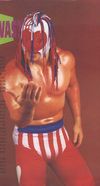 |
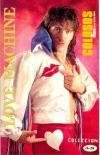 |
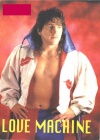 |
 |
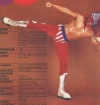 |
 |
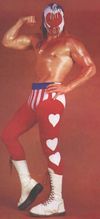 |
 |
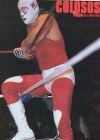 |
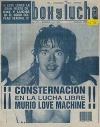 |
 |